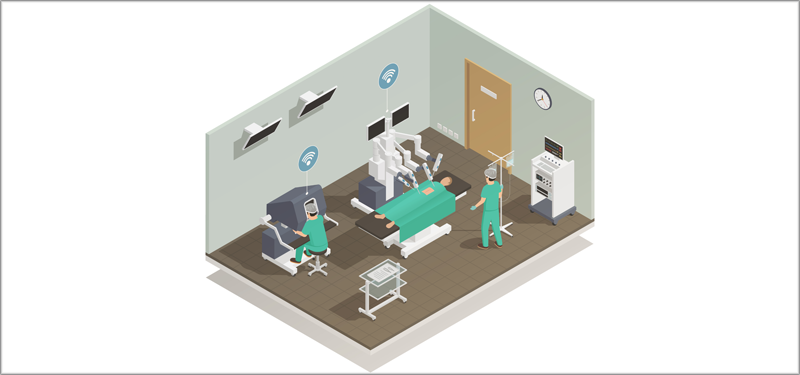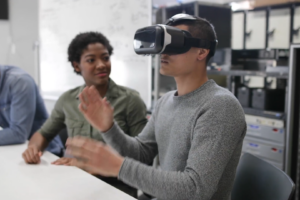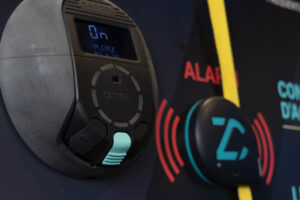
RODIN: Robust methods for statistical inference, data integrity and interference management in 5G communication networks and applications
April 22, 2022
Collaborative positioning techniques: integration into network optimisation systems and application to IoT environments
May 4, 2022A digital twin that can be used to anticipate and optimise resources
The project Hospitals 4.0 – Machine learning for more effective management involves the participation of the Center for Innovation in Electronics, Motion Control and Industrial Applications (MCIA) of the Universitat Politècnica de Catalunya · BarcelonaTech (UPC). The main aim of the project is to construct a digital twin to monitor, visualise and manage the state of maintenance of hospital equipment.
This digital twin represents accurately the activity of a real hospital environment in a simulated scenario. The simulation enables the management team to prepare for potential real situations and anticipate future actions by gathering data on the use and wear of systems.
Through the optimisation of resource availability, and the maintenance of resources within the hospital environment, the availability of medical equipment is guaranteed when necessary. Anticipation will avoid a lack of equipment or potential problems, with enough time to look for and start to activate solutions.

Pilot project on a real facility that is already running
Hospitals 4.0 is a short project (approximately between 9 and 10 months) and is currently in the phase of data collection from the Hospital de Terrassa. In addition, the first building information modelling (BIM) designs are being draw up for the area that will be monitored.
This pilot could validate the harmony and functionality of the various enabling technologies within Industry 4.0 that this project makes possible, including the simulation of systems, digital twins, machine learning, artificial intelligence, the internet of things (IoT) and the interconnection of systems.
As the next step, the “logic” part of the facility use simulator will begin to be designed. In this aspect, MCIA will be responsible for creating the machine learning algorithm. Along with the design of the simulator’s data flows that is being developed by CT Solutions Group and the database of medical records, the algorithm will enable a predictive, corrective equipment management system.

What will be the advantages to hospitals or health centres that implement this solution?
- Reduce costs by increasing efficiency in the use of hospital equipment. Due to predictive maintenance, unexpected events, and hence unwanted costs, can be anticipated. It will also be possible to determine the optimal performance of equipment.
- Improve operations. Anticipation of potential errors will facilitate the design and management of the preventive maintenance schedule and will reduce delays in periodic operations caused by incidents that require an urgent solution.
- Improve sustainability and the environment. Due to improvements in energy consumption of the systems involved in hospital operations, the solution will contribute to improving the environment and sustainability.
- Mitigate risks. The solution can carry out simulations that will help to determine and optimise the operation of the facility and its use and to identify whether the established preventive maintenance is suitable.
- Understand the interactions of the system. Digital twins from different systems can be combined to predict how they relate to each other. This function is very useful in the case of products and services from different suppliers.
- Perfect prediction. The machine learning model gathers all the data required to create predictive algorithms. These artificial intelligence systems can help to prevent faults and improve the functioning of the systems.
- Improve the capacity to care for patients. The incorporation of machine learning algorithms into maintenance management will provide a fault prediction mechanism and avoid equipment being out of service. In turn, the increase in availability of medical equipment will improve the capacity and quality of patient care.
- Predict needs for staff and additional resources. Through a simulator of the facility’s operation, the number of staff required in various situations can be predicted and determined, as well as if there are enough teams, and even a shortage of certain drugs can be anticipated.
Project members and state support
The project is funded through the Ministry of Industry, Trade and Tourism’s grants supporting Innovative Business Clusters (AEI) for an amount of 32,351 euros. It is led by the Smartech Cluster and participants include the Mental Health Cluster of Catalonia, MCIA UPC, BIM6D, the Joan Costa Roma Foundation and Cadtech Ibérica.

Sector
Would you like to know more?
Proyectos Relacionados
- The Visualisation, Virtual Reality and Graphic Interaction Research Group (ViRVIG) at the Universitat Politècnica de Catalunya - BarcelonaTech (UPC) has participated in the XR4ED project, an initiative that connects the educational technology (EdTech) and Extended Reality (XR) sectors, with the aim of transforming learning and training across Europe.
- The inLab FIB at the UPC has collaborated with Lizcore® for the development of a proof of concept based on artificial intelligence to improve safety in climbing with autobelay devices. The system allows the automatic and accurate detection of risk situations before starting a route.
- Researchers from the Centre for Image and Multimedia Technology of the UPC (CITM) and from the DiCode research group (Digital Culture and Creative Technologies Research Group) of the Universitat Politècnica de Catalunya – BarcelonaTech (UPC) have worked on the project The Eyes of History, an initiative of the Catalan Agency for Cultural Heritage that offers an immersive view of Catalan cultural heritage. It is especially aimed at the first and second cycles of secondary education and was created to bring heritage into the classroom. Its goal is to bring the history and monuments of Catalonia closer in a vivid and innovative way, using tools such as virtual reality and new museographic narratives.
- City and Play is a social action project coordinated by researchers from the Centre for Image and Multimedia Technology (CITM) and the DiCode research group (Digital Culture and Creative Technologies Research Group) of the Universitat Politècnica de Catalunya – BarcelonaTech (UPC), the Universitat Oberta de Catalunya (UOC) and the University of Barcelona (UB), and funded by Barcelona City Council. The aim of the project is to promote civic competences and reflection on the urban environment among adolescents through the creation of an open framework that uses methodologies based on play, co-creation and storytelling.




